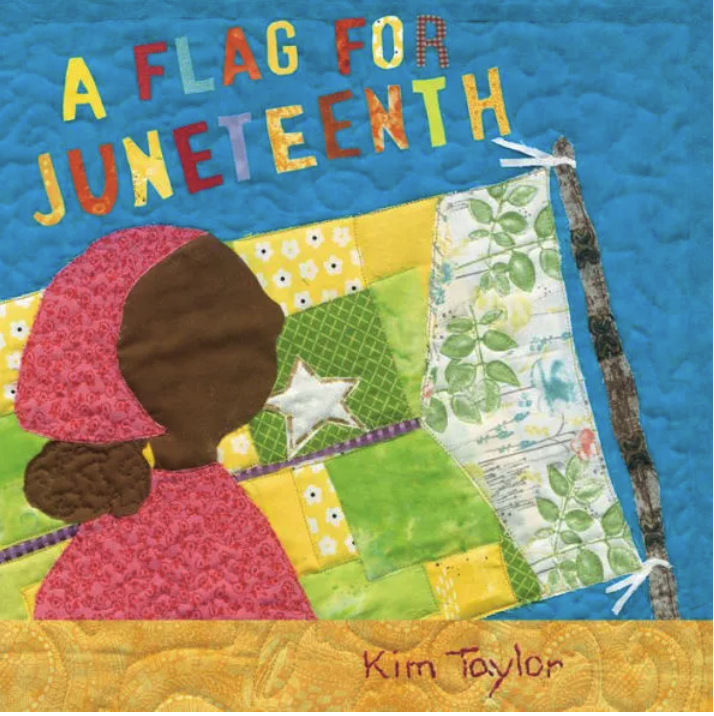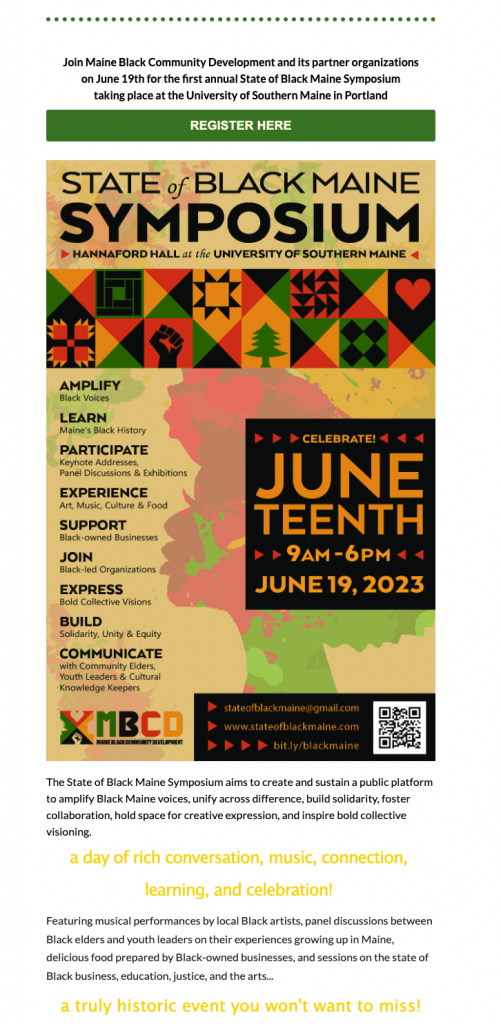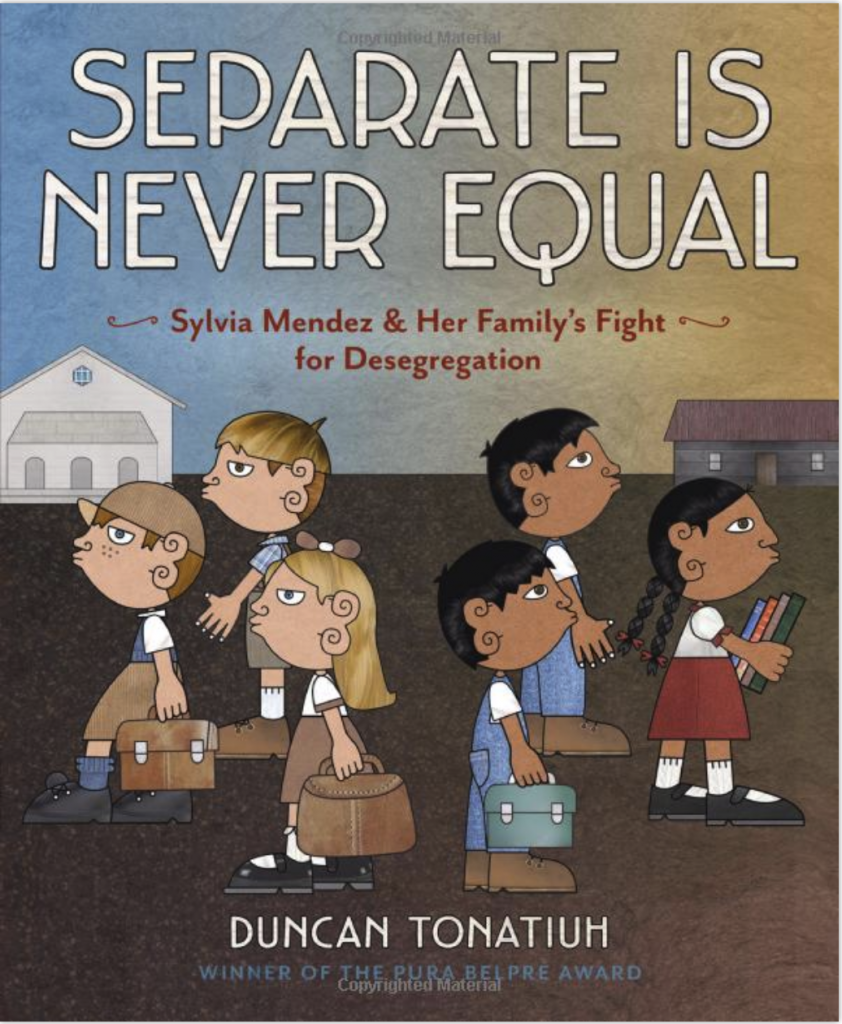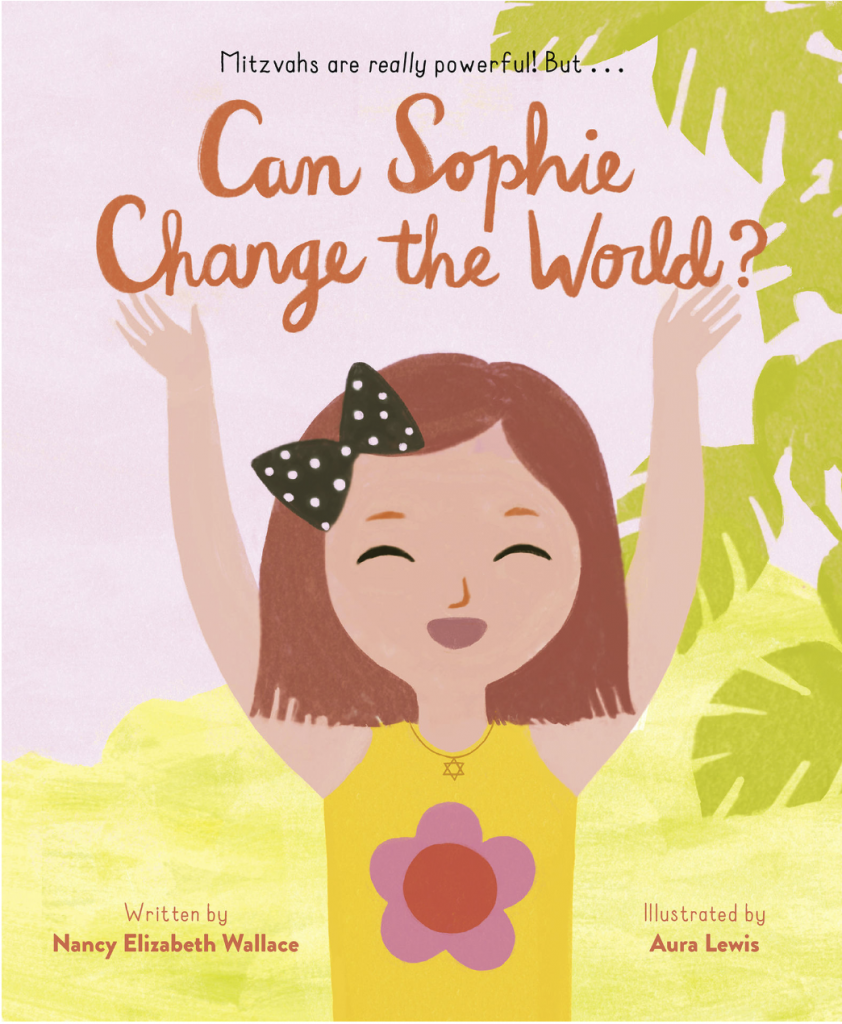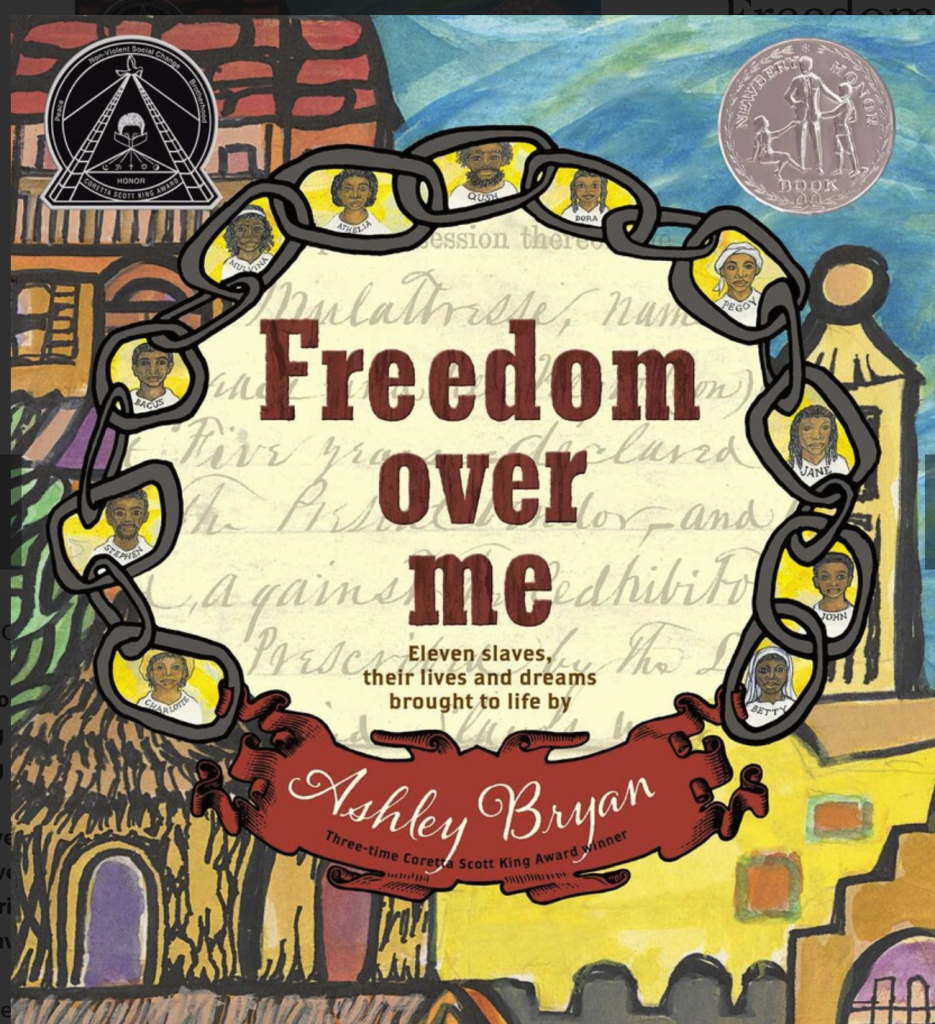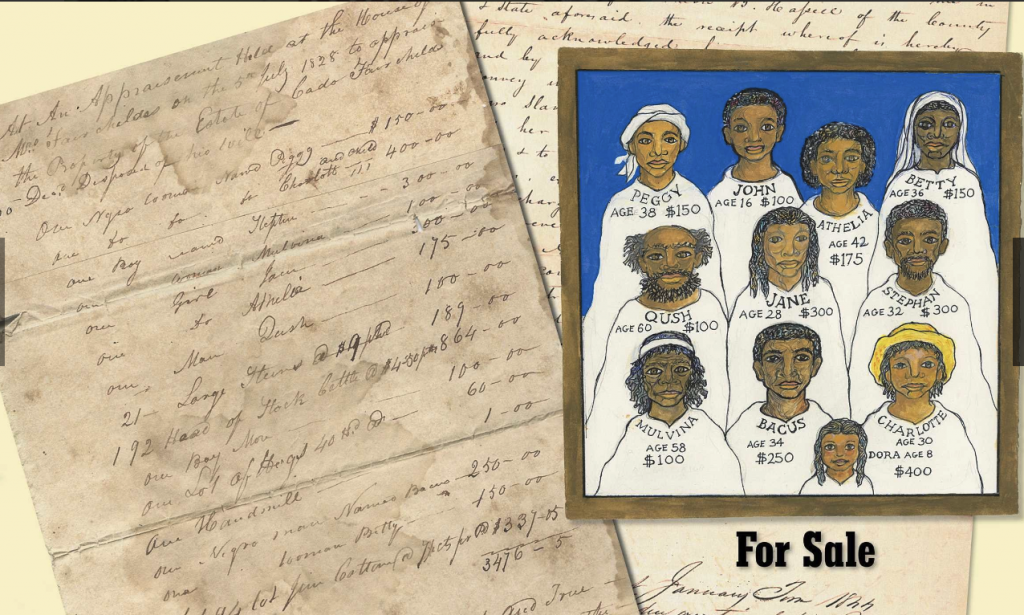From AFSC via our Peace and Social Concerns Committee
Category Archives: Peace and Social Concerns
Friends Committee on National Legislation (FCNL) Urges Action on Palestine-Israel
Here is the most recent “Take Action“from FCNL on the unfolding tragedy in Israel-Palestine. Our Peace & Social Concerns Committee urges us to communicate with Congress.
The U.S. Must Act to De-Escalate the Violence in Israel and Palestine
We are heartbroken by the recent violence in Israel and Gaza. As Quakers, we deeply mourn the loss of all lives and pray for those who have lost loved ones due to this latest escalation. We unequivocally condemn Hamas’ attacks and inhumane treatment of civilians and call for the immediate release of all hostages. We also condemn the indiscriminate and violent Israeli response that has already claimed hundreds of civilian lives.
More war and weapons won’t bring peace. In the face of growing violence, lawmakers must:
- Work to de-escalate this situation by calling for restraint, ceasefire, de-escalation, and respect for international law.
- Protect lives—those of the Israeli hostages and the roughly 1 million children who live in Gaza.
- Address the root causes underlying this explosion of violence, including decades of institutionalized oppression and collective punishment of Palestinians through brutal military occupation and a 16-year Gaza blockade.
Urge Congress to call for an immediate ceasefire, de-escalation, and restraint to prevent further civilian harm in Israel and the occupied Palestinian territories.
Indigenous People’s Day Celebration, October 9, 2023, 10am to Noon
Through it’s Peace and Social Concerns Committee, Durham Friends Meeting is one of the sponsors of an Indigenous People’s Day celebration, Monday, October 9, 10am to Noon on the Brunswick Mall
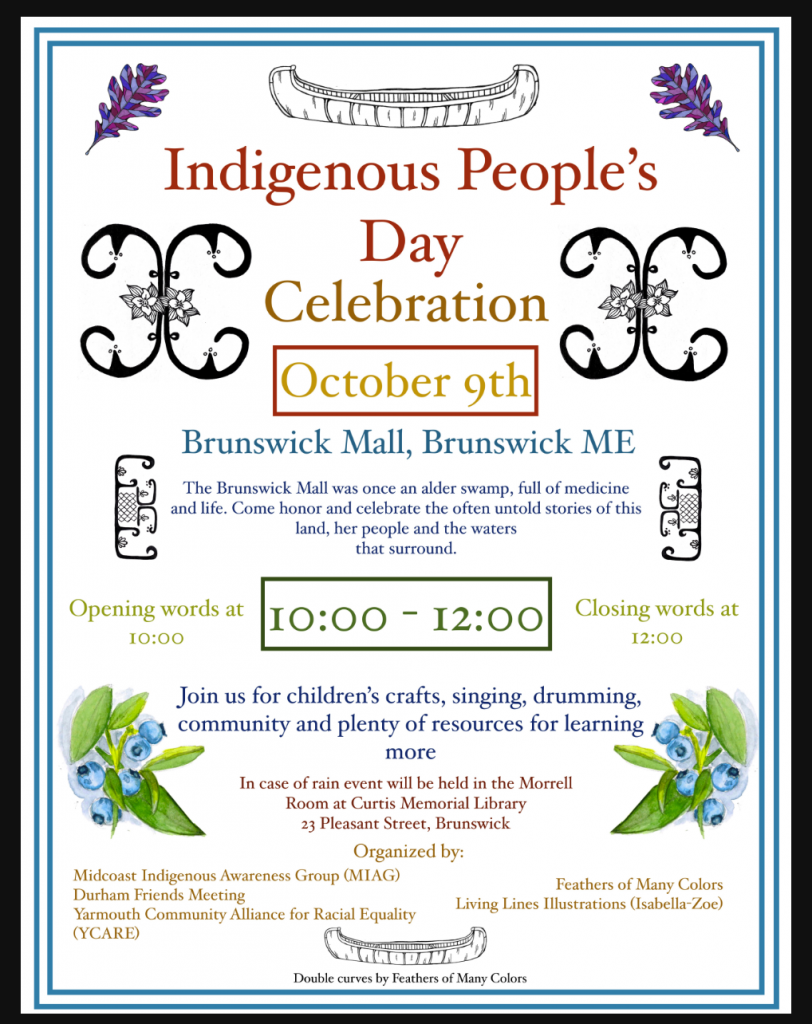
Seeking Kitchen Items for Brunswick New Mainers
Peace and Social Concerns Committee is encouraging donations to an effort to collect kitchen items for new Mainers soon to be housed in Brunswick. Items can be brought on Saturday, September 23, 10am to 4pm.
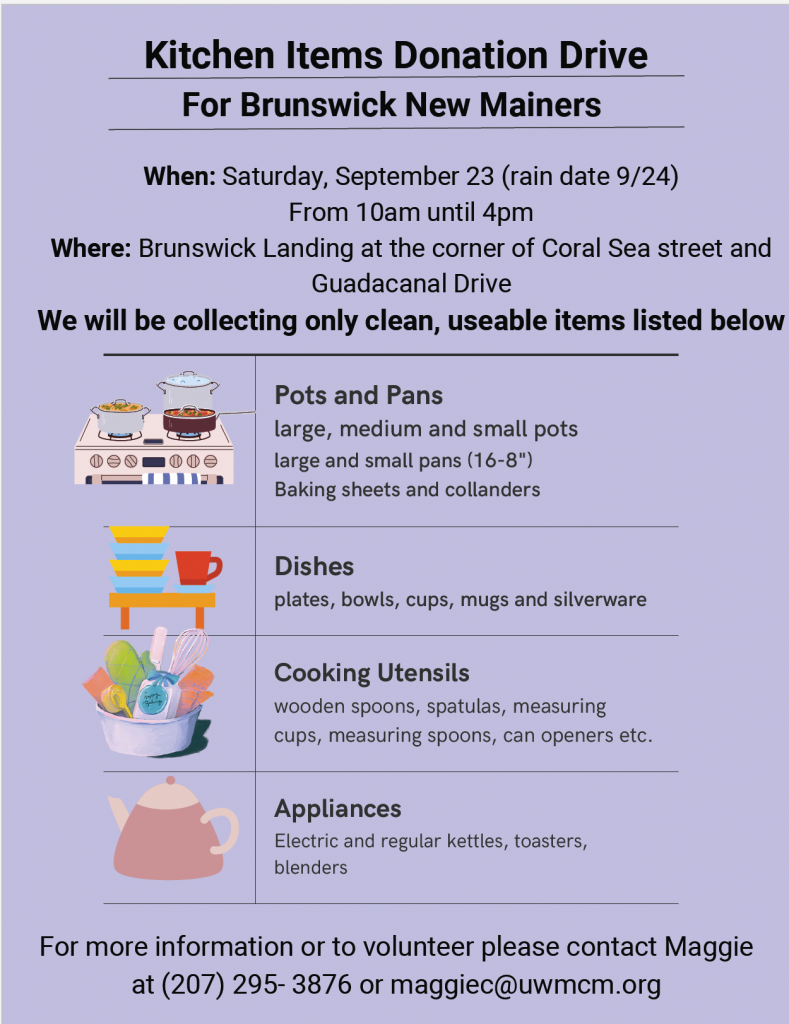
The Quaker Indigenous Boarding Schools: Facing Our History and Ourselves, September 10, 2023, 12:30 to 2:30 pm
The Quaker Indigenous Boarding Schools: Facing Our History and Ourselves; A presentation by Paula Palmer, Gail Melix, and Andrew Grant on Sunday September 10 from 12:30 to 2:30.
Join us in the Durham Friends Meetinghouse. We will gather as a community to participate in this event by Zoom. Bring a picnic lunch.
Peace & Social Concerns
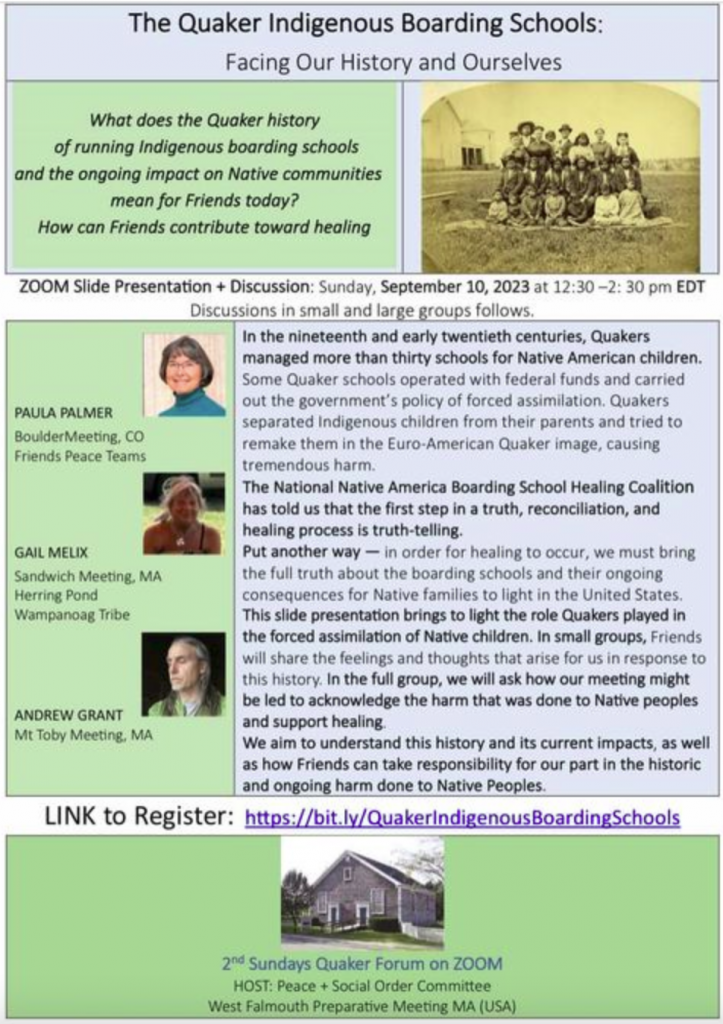
Legislative Alert, June 2, 2023
Two bills of great importance to the Wabanaki are passing through the state legislature quickly before the end of the session this month. Hearings have already happened on these bills and they are moving to the legislature for votes. PLEASE let your Representatives and Senators know that you support these bills. More information about them is on the Wabanaki Alliance website.
L.D. 2004, sponsored by House Speaker Rachel Talbot Ross, D-Portland, and co-sponsored by six Republicans, including House Minority Leader Billy Bob Faulkingham, of Winter Harbor, would allow tribes to benefit from most federal laws – past, present and future. Jurisdiction over serious crimes and gambling would remain under the state’s purview.
Currently, Congress must specifically make Maine tribes eligible for any new federal program or law that affects the state-tribal relationship, which tribal leaders say can include almost anything.
Talbot Ross’ bill seeks to flip that paradigm, forcing the state to lobby Congress to exclude tribes from any future legislation that applies to the nation’s Indigenous tribes. See the attached talking points that do not include the LD number yet.
The second bill, LD 1970, An Act to Enact the Maine Indian Child Welfare Act, is discussed in the talking points below.
Talking points for LD 1970: “An Act to Enact the Maine Indian Child Welfare Act,”sponsored by Rep. Donna Bailey, D-York.
- 1. In 1978, the U.S. Congress worked closely with American Indian and Alaska Nativeelected officials, child welfare experts and families whose children had beenunnecessarily removed from their homes to pass the Indian Child Welfare Act of 1978.ICWA was designed to protect Indian children and families from biased child welfarepractices and well-documented disregard for their families and culture.
- 2. In 1978, according to theNational Indian Child Welfare Association, nationwide 25% to35% of all Indigenous children were removed from their homes by state child welfareand private adoption agencies. As many as 85% of those children were placed outsideof their families and communities—even when fit and willing relatives were available.
- 3. In Maine, according to a 2015 report of the Maine Wabanaki-State Child Welfare Truth &Reconciliation Commission, Wabanaki children were placedin foster care in similarlyhigher rates than non-Native children prior to ICWA’s enactment in 1978. For AroostookCounty in 1972, the rate of removal for Wabanaki children was 62.4 times higher thanthe statewide rate for non-Native children. The rates for Maine were the second highestin the nation at that time. (Source:Maine Wabanaki-State Child Welfare Truth &Reconciliation Commissionreport, page 21)
- 4. Even after ICWA’s enactment, a disproportionately higher rate of Wabanaki children inMaine are taken into foster care than non-Native children. (Source:Maine WabanakiState Child Welfare Truth & Reconciliation Commissionreport, page 21)
- 5. ICWA serves the best interests of Wabanaki and other Native American children bykeeping them connected to their culture, extended family and community, which areproven protective factors. (Source:“The Indian Child Welfare Act Fact Sheet”preparedby the National Indian Child Welfare Association).
- 6. ICWA has been labeled the “gold standard” in child welfare policy and practice by acoalition of 18 national child advocacy organizations. (Source:“The Indian Child WelfareAct Fact Sheet”prepared by the National Indian Child Welfare Association).
- 7. Nearly 500 tribes, hundreds of supporters, and at least 87 members of Congress supportICWA as the abiding standard in Native child welfare. Source:Partnership With NativeAmericans).
- 8. Maine’s U.S. Sens. Susan Collins and Angus King and Rep. Chellie Pingree are amongthe 87 members of Congress who signed the “friends of the court” brief supporting ICWAin the pending U.S.Supreme Court review of ICWA’s constitutionality in theBrackeen vs.https://sct.nHaalandcase that is expected to be decided in June. (Source for‘friends of the court”congressional supporters: page 43-46).
- 9. Maine is one of 26 states that filed “friends of the court” briefs in 2019 supportingICWA inthe pendingBrackeen vs. Haalandcase. (Source: Native American Rights Fund,amicusbriefs tribal side.)
- 10. By enactingLD 1970, Maine would join 12 other states that have acted to codify ICWAprotections on the state level. This would protect Wabanaki children, families, cultureand sovereignty if the U.S. Supreme Court decides in June to weaken or destroyprotections that have been known as the “gold standard” of child welfare policies for 40 years. (Sources:Native Organizers Alliance Action FundandNative Americans RightsFund)
Links to sources that might be useful:
- 1.Native American Rights Fund summary of the Haalandv. Brackeen lawsuit brought byTexas and several individual plaintiffs who allege ICWA is unconstitutional.https://narf.org/cases/brackeen-v-bernhardt/
- 2.Setting the Record Straight: National Indian Child Welfare Association’s fact sheet onICWA.https://www.nicwa.org/wp-content/uploads/2018/10/Setting-the-Record-Straight2018.pdf
- “Beyond the Mandate: Continuing the Conversation.”3.2015 Report of the MaineWabanaki-State Child Welfare Truth & Reconciliation Commission.
- FinalState Amicus Brief -Brackeen v. Bernhardt4., signed by Maine and 25 other states.
Nihkaniyane: A Celebration of Our Alliances, July 13, Freeport
From the Wabanaki Alliance, lifted up by DFM’s Peace & Social Concerns Committee
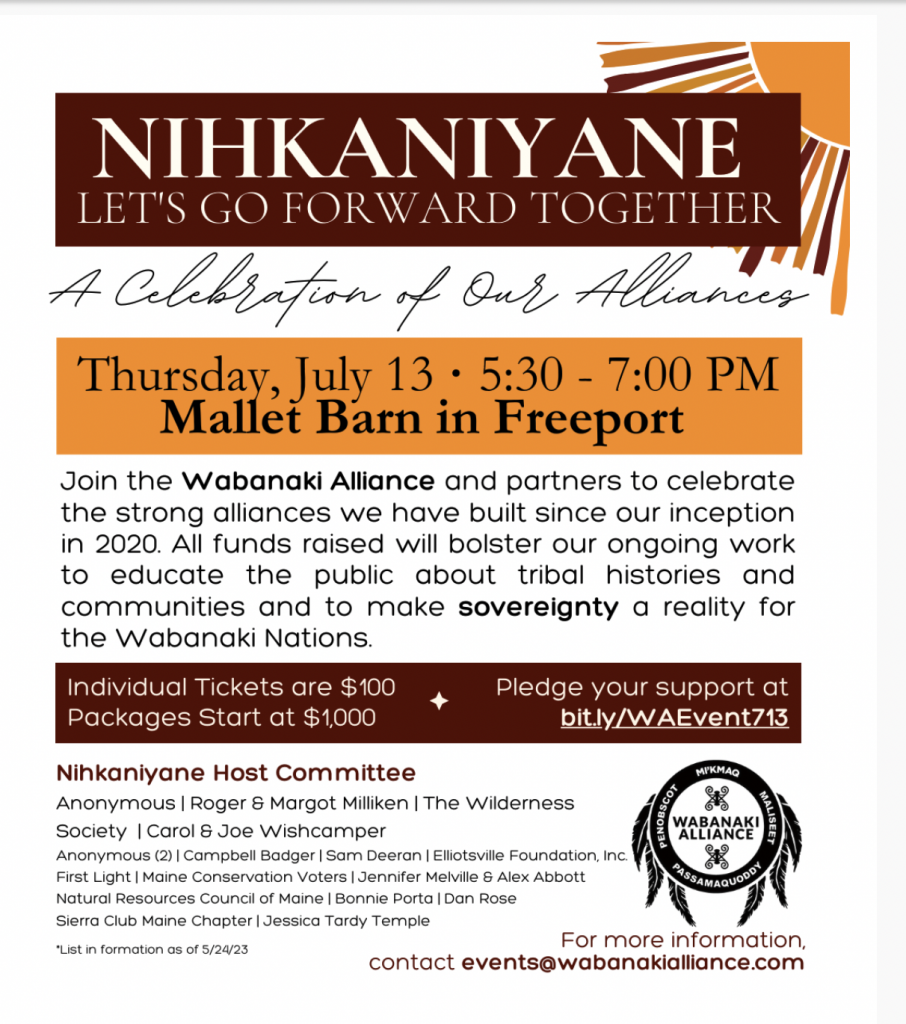
State of Black Maine Symposium, June 19, 2023, 9am to 6pm, USM
Legislative Alert, May 20, 2023
From Peace and Social Concerns Committee:
Sponsor: House Speaker Rachel Talbot Ross, D-Portland
The Wabanaki Alliance supports this bill. Read our testimony»
SUMMARY
This bill would restore language regarding Maine Indian treaty obligations to all printed copies of the Maine Constitution. In 1876, the state constitution was amended to remove certain sections of Article X from print. Article X incorporates most of the 1819 act that separated Maine from Massachusetts and includes a timeline for starting the new Maine government. Section 5 of the article, one of three affected by the 1876 amendment, clarifies Maine’s obligation to uphold and defend treaties made between Massachusetts and the Passamaquoddy and Penobscot Nations. While the three sections remain in force and can be read online, the 1876 amendment prohibits their inclusion in printed versions of the constitution. LD 78 is an amendment to the state constitution that would require that Section 5 be included in all printed copies of the constitution. Constitutional amendments require passage by two-thirds of each legislative chamber before advancing to the voters for approval. Learn more about the removal of section 5 in this report or watch REDACT, a recording of a Maine Historical Society panel discussion on the topic. Read the complete bill text»
⚠️ STATUS: Legislature will vote soon
The Committee on Judiciary held a public hearing on LD 78 Tuesday, March 7 (read the public testimony). At a March 16 work session, LD 78 was amended to stipulate that all provisions of Article X, not just Section 5, be included in printed version of the constitution. The committee voted that the bill Ought to Pass as Amended. The bill will go to the House next for a vote.
TAKE ACTION
» Contact your legislators. Contact your legislators and ask them to vote YES on LD 78. Find your legislators and their contact info here»
This was copied from the Wabanaki Alliance website.For more information or a link to learn the contact information of your Representative go to:
Update from Friends Committee on Maine Public Policy, May 2023
Friends Committee on Maine Public Policy (FCMPP) was launched in the 1980’s by Ed Snyder following his retirement from Friends Committee on National Legislation in Washington. He envisioned a statewide network of Quaker activists who could coordinate their advocacy efforts on timely topics under consideration in the Maine Legislature. At the beginning it was decided to focus on two policy areas where broad agreement among Friends could be anticipated without having to seek specific approval from all the local meetings: 1) tribal/state relations (i.e. Wabanaki concerns) and 2) civil liberty/criminal justice concerns (e.g. death penalty).
FCMPP used to meet in person on a regular basis to share reports, decide on issue priorities, and sustain ongoing personal connections. The passing of some in the founding cohort and the onset of Covid required meeting on zoom and a reduced capacity to handle a wide range of issues.
In recent years the focus has increasingly centered on Wabanaki concerns. There is a long history of Quaker efforts to assist the Maine tribes—e.g. the separate American Friends Service Committee program on Maine Indians. Two developments enhanced FCMPP attention to tribal matters: the Truth and Reconciliation Commission on Indigenous children taken from their families and the Task Force on needed amendments to the Land Claims Settlement Act of 1980 which cut off Maine tribes from benefits of Federal legislation affecting all tribes in the other forty-nine states.
A core group of FCMPP members has been intensely engaged in relevant support efforts, at times in close coordination with a counterpart Episcopal support group. FCMPP members have attended legislative hearings and given testimony—both spoken and written—on specific bills and placed op-eds and Letters to the Editor in local newspapers. They have travelled to all five Wabanaki settlements to meet in person with the tribal leaders in the effort to be informed allies. Several members regularly take part in a weekly zoom session led by the Wabanaki Alliance (the tribal chiefs, leaders, and staff) to coordinate advocacy and outreach endeavors including joint lobby visits with legislators. FCMPP leaders along with leaders from several other church groups have set up in-person meetings with Democratic and Republican leaders in both the House and Senate.
The major pending bill is based upon the Task Force recommendations to amend the 1980 law in order to restore a fuller measure of tribal sovereignty as well as economic benefits from Federal legislation. Several smaller relevant bills have been supported and seem likely to pass but the sovereignty bill will require a 2/3 vote on both chambers to overcome an expected veto from the Governor.
We will hand out today a Guide to Citizen Lobbying and giving testimony before legislative committees prepared by FCMPP for fellow Quakers as they may be led to express their views on current issues.
In February members of FCMPP met in a sorting session led by Peter Woodrow to assess future endeavors of the group. We recognize that our work evolved to focus primarily on tribal/state concerns. We are open to further evolution to take up other concerns. We welcome queries and expressions of interest from other Friends in Maine. What do you think a state-based Quaker advocacy group in Maine should be dealing with now?
Queries/Responses may be sent to: Jim Matlack jmatlack38@gmail.com and Shirley Hager Shirley.hager@maine.edu
Legislative Alert, May 13, 2023
LD 78: The Maine House will soon vote on LD 78 a bill that is important to the Wabanaki. It will require text of Maine Indian Treaty obligations to be published in all copies of the state Constitution. Now is the time to write your Representative asking them to support this bill. Use the link below to get access to information about how to contact your Representative.
LD 336: Also note that the Wabanaki Alliance does not support LD 336. Let your representative know that you oppose it too. More information about this and other bills can be found on the Alliances Legislative Tracker. The link is below.
Discussion with Former Penobscot Nation Chief Barry Dana, May 22, 6pm at Curtis Library
Recommended by Peace and Social Concerns Committee:
Arts Are Elementary Presents:
A Discussion with Former Penobscot Nation Chief Barry Dana
Mon. 5/22 at 6:00pm
Curtis Library, Morrell Meeting Room
Arts Are Elementary is pleased to bring Former Chief of the Penobscot Nation, culture preservationist, long time educator, artist, and professional basketmaker Barry Dana to Brunswick. He will lead an open discussion about Wabanaki history and culture.
Letter to Senator Angus King, March 20, 2023
March 20, 2023
Senator Angus King
133 Hart Building, Washington, DC 20510
Re: H.R. 6707
Dear Senator King,
You recently decided not to support passage of H.R. 6707 brought by Representative Golden that dealt with the Maine Indian Claims Settlement Act when it came before you for consideration. You will recall that his bill would have removed the provision in the Act which states that future Indian legislation does not affect the Maine tribes unless those tribes are specifically made subject to it. A number of our members were disturbed by the statements in your letter which explained why you did not support that bill.
As Quakers, we believe that it is fair and reasonable to give the Wabanaki tribes the same rights under subsequent Congressional legislation dealing with Indian issues as that which is guaranteed to all other tribes. Many scholars have stated that this provision in the Act was not discussed by the parties during the negotiations which led up to the final draft of the Act. Or if it was discussed at all, it was not part of what you describe as “the fundamental position of the State in the negotiations leading up to MICSA.”
Removing this provision seems consistent with the concept that Federal law should always be considered in light of present-day conditions. As the attached article makes clear, the Wabanaki currently are significantly poorer than other American tribes. Removing this provision would go a long way towards equalizing their status relative to the other tribes.
Thank you for your consideration of this. If you wish to discuss the contents of this letter further, please contact Cushman Anthony, a member of our Peace and Social Concerns Committee and former chair of the Maine Indian Tribal State Commission; or contact our Clerk, Leslie Manning at the above address.
Sincerely,
Durham Monthly Meeting of Friends
The attached enclosure can also be found at https://theconversation.com/tribes-in-maine-left-out-of-native-american-resurgence-by-40-year-old-federal-law-denying-their-self-determination-198386
Legislative Alert from Peace & Social Concerns — April 28, 2023
This would be a good time to let your legislators know of your interest in the well-being of the Wabanaki. There are a number of bills that are of potential benefit to the Tribes, we will highlight three of them here. We are also providing a link to the Wabanaki Alliance Legislative Tracker. There you can find further information about each bill and access to contact information for your legislators.
LD 1642: An Act to Strengthen the Teaching of Wabanaki Studies in Maine Schools
The previous bill from 2001 was an unfunded mandate to teach Wabanaki history and culture in Maine schools. This bill will establish a Wabanaki Studies Commission and provide permanent funding for resources, materials, and continuing education for teachers.
LD 78: RESOLUTION, Proposing an Amendment to Article X of the Constitution of Maine Regarding the Publication of Maine Indian Treaty Obligations
This bill restores language regarding Maine Indian Treaty obligations to all printed copies of the Maine Constitution. The legislature is going to vote on this bill soon so now is the time to let your representatives know of your support.
LD 1115: An Act Regarding Economic Development Funds for Federally Recognized Indian Tribes
This bill would require the Department of Economic and Community Development to allocate 10% of the available economic development funds in the Community Development Block Grant Program to Tribes in Maine.
NOTE: There is one bill that the Alliance opposes. LD 336. You can see their reasoning on the website.
Here is the link: https://wabanakialliance.com/131st-bill-tracker/
Action Items from Peace and Social Concerns, April 2023
For April 2023, here is what our Peace and Social Concerns Committee is urging us to do:
P&SC is asking you to be advocates for our Wabanaki neighbors this legislative season. When there are bills we feel are important we will post a “Legislative Alert from P&SC” on the web and in the Tuesday email. Please look for them. We will share a link to the Wabanaki Alliance Legislative Tracker that gives information on the current status of the bill and a link to help you contact your legislator. If you would like to check it out now here is the link: https://wabanakialliance.com/131st-bill-tracker/. We are currently following LD 336, which the Alliance does not want to pass and LD 1115 which would bring important Community Development funds to the Tribes.
We encourage support of Brunswick’s preparation for the 60 New Mainer families coming to live in our community. You can give money to the GoFundMe account at this following link. These funds will be used to set up the 60 apartments being built for the families. There are also opportunities to be on a family support team through Family Promise in Portland. The link is: michelle@gpfamilypromise.org.
The Social Justice Enrichment Project will close out this school year with one more session with Linda Ashe-Ford. It will focus on introducing children to the Civil Rights Movement through books about Ruby Bridges. We will also conduct feedback interviews with the teachers in May. We will hear about the Obadiah Brown Grant in mid-May. We have begun talking with teachers about it and many of this year’s teachers are interested in continuing to work with us if we get the grant. It would definitely benefit the project to have teachers who have been with us for one year.
“Fighting Indians” Film Viewing and Discussion
Peace and Social Concerns Committee encourages us to watch “Fighting Indians,” a film to be shown on Maine Public (PBS) on April 6 (9pm) and April 8 (2pm).
They also encourage us to participate in a follow-up discussion of the issues raised by the film, via Zoom, on Monday April 10 at 7:00 PM.
This film tells the story of the struggle to change the name of the Skowhegan High School mascot. This was a contentious struggle that went on for years but ended successfully. This story has relevant lessons for the Peace & Social Concerns project to change the name of the 250th Anniversary Park in Brunswick. We recommend watching.
Fighting Indians
Maine Public TV Air Times:
Thur., April 6 at 9:00 pm
Sat., April 8 at 2:00 pm

On May 16, 2019, The State of Maine made history by passing LD 944 An Act to Ban Native American Mascots in all public schools, the first legislation of its kind in the country. For Maine’s tribal nations, the landmark legislation marked the end of a decades-long struggle to educate the public on the harms to Native “themed” mascots.
“Fighting Indians” chronicles the last and most contentious holdout in that struggle, the homogeneously white Skowhegan High School, known for decades as “The Home of the Indians.” This is the story of a small New England community forced to recon with its identity, its sordid history, and its future relationship with its indigenous neighbors. It is a story of a small town divided against the backdrop of a nation divided where the “mascot debate” exposes centuries-old abuses while asking if reconciliation is possible.
Produced by Mark Cooley, Derek Ellis and StoveUp LLC.
Learn more about this film at fightingindians.com.
Kuhkomossonuk Akonutomuwinokot: Stories Our Grandmothers Told Us, Reviewed by David Etheridge — in Friends Journal
Peace and Social Concerns Committee calls our attention to an exciting new book. Here’s a review from Friends Journal:
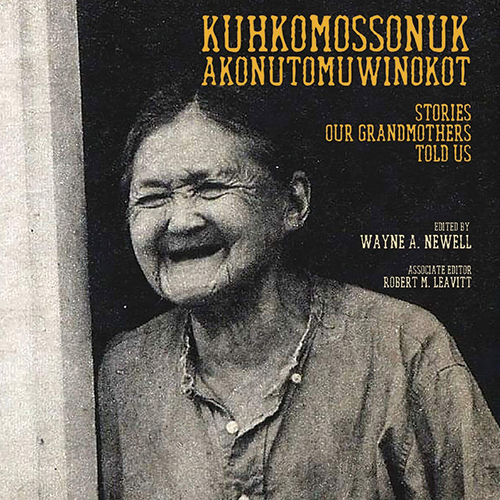
March 1, 2023
Edited by Wayne A. Newell, associate editor Robert M. Leavitt. Resolute Bear Press, 2021. 208 pages. $34.95/hardcover; $24.95/paperback; $2.99/eBook.
This collection of stories from the Passamaquoddy Indigenous community of Maine, Kuhkomossonuk Akonutomuwinokot: Stories Our Grandmothers Told Us, is a 45-year labor of love by Passamaquoddy editor Wayne Newell, who died in late 2021, several months after its publication (editor’s note: see his milestone here). He was born and grew up on Passamaquoddy lands. He founded a bilingual education program in the 1970s, served on the tribal council, and was president of the tribe’s Northeast Blueberry Company. His life intersected with Quakers when he was ten years old at a Quaker workcamp. In the 1970s, he directed American Friends Service Committee’s Wabanaki Program. In the 1980s and 1990s, he participated in “the Gatherings” with Quakers, Natives, and others to reimagine Indigenous–settler relations.
The collection is charming and engaging while also being scholarly. All stories appear in both Passamaquoddy and English with a pronunciation guide for the Passamaquoddy. There is a web address for an online Passamaquoddy Maliseet dictionary, maintained by the associate editor, that includes video recordings of native speakers using some of the words from the dictionary. The stories are also accompanied by illustrations in a variety of styles. Some of the stories were initially recorded on wax cylinders in the late-nineteenth century.
The first story, which was written in 1979, talks about daily life in the 1920s through the experience of Mary Ann, a girl roughly the age of the editor’s parents. It covers events like births and deaths, doing laundry, going to school, celebrating Halloween, and listening to stories told by her elders. This account helps readers understand how storytelling was a part of daily life. It is accompanied by a photograph of school children Mary Ann’s age with annotations identifying those children as people who grew up to help write this book.
The next group of stories are mostly about animals: ants, flies, crickets, and mice. To help readers appreciate the storytelling experience, the first story includes photographs of the storyteller gesturing with her hands and head to illustrate the story as she tells it. The photographs and drawing for that story are by the associate editor of the book, a linguist who also has been working for about a half-century on learning both these stories and the Passamaquoddy language.
The volume then turns to a series of stories about struggles between the devil and ordinary people. These are mostly trickster stories where the devil and ordinary people are trying to outsmart one another. One is a Job-like story where an angel and the devil try to win over a person to their side. In another, the devil asks an ordinary human to help split up a devoted couple. The human uses gossip to accomplish the task. The devil gives the person a bag of gold saying, “You’re more of a devil than I am.”
Another set of stories feature motewolon, which are people with extraordinary powers that are used for both good and bad purposes. They are also responsible for ghosts that sometimes cause trouble, often inspire fear, and at other times are simply mysterious.
The final collection is titled “Passamaquoddy Stories.” The protagonist for most of them is a superhero called Koluskap. In one tale, Koluskap tracks down a huge owl that is making the world too windy by flapping its wings. Koluskap puts the owl in a crevice, so it cannot flap its wings. Then the air becomes too calm. Koluskap extracts the owl in a way that permits it to flap only one wing. The result is the intermittent windiness of modern times. Humans are fearful of the power of Koluskap, but usually those powers are used to benefit them.
Koluskap is also the protagonist in Aladdin-style stories of fulfilling human wishes that lead to unexpected results. For example, a man who wishes to be loved by women is accosted by young women who literally smother him with their attention resulting in his death. The story ends with this statement: “What happened to the maidens is not known.”
The book gives readers insights into several aspects of Passamaquoddy culture as well as an appreciation for the imaginative creativity of that culture.
David Etheridge is a member of Friends Meeting of Washington (D.C.), clerk of the Baltimore Yearly Meeting Working Group on Racism, and previously worked for over 20 years as an attorney in the Indian Affairs Division of the Solicitor’s Office of the U.S. Department of the Interior.
FCNL Seeks Input on Its Reproductive Health Care Stance; Durham Friends to Hold Discernment Session on March 19
Friends Committee on National Legislation (FCNL) is asking for input from Friends and Friends Meetings regarding the stance it should take regarding Reproductive Health Care. We are being asked to discern if we recommend that reproductive health should be included in FCNL’s legislative priorities.
On Sunday, March 19, Durham Friends will hold a one hour discernment session at the rise of Meeting for Worship for the Conduct of Business. If it is necessary to schedule another session, we will do so in April, as our recommendation is not due until May 1.
As requested, let us hold this matter tenderly. There is a virtual opportunity for learning on March 22 at 6:30 PM Supporting Friends Discernment on Reproductive Health. All are welcome.
What follows is the request from FCNL and some guidelines for participation
We greatly value your engagement with this complex issue, and we encourage you to hold compassion for each other during these conversations. Continue to seek Divine Guidance and Spirit’s revelation as you weigh deeply the way forward for FCNL—one that respects the different religious and moral perspectives we all carry.
Your responses are requested by May 1, 2023. Your group can submit them electronically (preferred) at fcnl.org/policycommittee or by emailing policycommittee@fcnl.org. Postal submissions can be sent to 245 2nd St, NE, Washington, DC 20002.
Please note that during its discernment, the Policy Committee will give greater weight to group responses over individual responses.
What follows are guidelines for participating in this conversation, resources to support your discernment, and answers to frequently asked questions. You can also join us on March 22 at 6:30 p.m. EST for a virtual event to aid your discernment. Click here to register.
Thank you again for your faithful and spirit-led discernment.
 | In peace,Ebby LuvagaClerk, FCNL Policy Committee |
Guidelines for Participating in the Reproductive Health Care Discernment
Whether you are gathering in person, online, or in a hybrid format, we hope that your discernment will be spiritually grounded and a result of group conversations. These discussions may take many forms, including discernment by a committee, an informal group, or a First Day discussion topic. Some meetings or churches may adopt a minute expressing the sense of their group, although this is not a requirement.
Resources for Guiding your Discussion
You may want to prepare for discernment by reading the pamphlet, A Guide to Dialogue About Abortion. Tools such as this can help your conversation honor the complexity and urgency surrounding this topic.
Tips shared include honoring stories from lived experience, taking short breaks for moments of reflection, and building cultures of trust and understanding. Also refer to FCNL’s Policy Statement, The World We Seek (Section III.2.6), which outlines FCNL’s current statement on abortion issues.
To allow for the inclusion of a diversity of voices, we hope you will include people of different ages, backgrounds, and lived experiences in your discernment. Please identify at least one person who will submit your group’s responses.
Guidelines for Group Discernment
After an opening period of waiting worship, the gathering might begin with a brief description of the discernment process and the purpose of gathering. Participants may share their concerns about reproductive health care based on the queries provided to support their discernment process.
Frequently Asked Questions
How to Submit your Group’s Responses
Please respond by May 1, 2023. Your group can submit electronically (preferred) at fcnl.org/policycommittee or by emailing policycommittee@fcnl.org. Postal submissions can be sent to Amelia Kegan, 245 2nd St, NE, Washington, DC 20002.
What information should you record?
Please include the following information as part of your submission:
- Who is responding? (Group (preferred) or individual. Note your Yearly Meeting.)
- Who participated? (The number in the group and approximate ages.)
- What kind of gathering? (Committee meeting, informal gathering, meeting for business, etc.)
- Who is the group’s contact person?
- Responses to the queries.
- Any additional comments on the process your group would like to share?
What happens to the responses after FCNL receives the submissions?
The FCNL Policy Committee, a working group of the General Committee, will read all the responses and meet to consider what meetings, churches, groups, and individuals are telling FCNL regarding reproductive health care. They will share their summary with FCNL staff and the FCNL Executive Committee, then hold listening sessions with the General Committee in the summer of 2023.
The Policy Committee will bring its recommendation to the FCNL General Committee during its Annual Meeting in November 2023.
Throughout the process, the discernment by Friends across the country remains at the center of the committee’s consideration.
Where can I find more information?
You can find the contents of the previous mailing here. If you have additional questions, contact Policy Committee members Ebby Luvaga (luvaga@iastate.edu) and Genie Stowers (gstowers835@gmail.com).
Two Presentations on Wabanaki Matters, March 8 (6:30 pm) and March 17 (noon)
Peace and Social Concerns calls our attention to two presentations about Wabanaki related matters. Both will be via ZOOM, and both require prior registration.
March 8: Why Tribal Sovereignty? 6:30-8:00 pm, Via ZOOM;
UPDATE: link to introductions here; link to presentation here
A discussion with Maulian Dana, Penobscot Nation Ambassador & President of the Wabanaki Alliance.
Maine, alone among all other states in the U.S., does not recognize the sovereignty of the federally recognized tribes in our state—sovereignty honored in the U.S. Constitution and inherent in the Wabanaki people who have lived on and stewarded this land we now call Maine for thousands of years. Bills submitted to the 131st legislature seek to restore Wabanaki tribal sovereignty in a step towards repairing the broken tribal/state relations. Join us in learning why acknowledging and restoring Wabanaki sovereignty will benefit all people who live in Maine.
This event is a collaboration of Midcoast Indigenous Awareness Group, Unitarian Universalist Church of Brunswick Maine, and Curtis Memorial Library
Date: Wednesday, March 8, 2023; Time: 6:30pm – 8:00pm
This is an online event. Registration is required. Event URL will be sent via registration email.
March 17: Federal Indian Policy: Impacts on the Wabanaki Nations in Maine…And Beyond, Noon to 1 pm, via ZOOM; registration required
A recent report from Harvard University found that “the subjugation of the Wabanaki Nation’s self-governing capacities is blocking economic development to the detriment of both tribal and nontribal citizens, alike. For the tribal citizens of Maine held down by MICSA’s restrictions, loosening or removing those restrictions offers them little in the way of downside risks and much in the way of upside payoffs.” Professor Joe Kalt, co-director of the Harvard Project on American Indian Economic Development at Harvard University’s Kennedy School of Government, will discuss results of the Project’s recent study of the impacts of the unique provisions of the Maine Indian Claims Settlement Act on the Wabanaki Nations.
Sponsored by Maine Conservation Voters. Registration is required.
Prayer Vigil with a Concern for the Families Losing Shelter Due to the Ending of the Emergency Assistance, at the Statehouse, December 7, 2022, 9:30 to 11:00
An announcement form Peace and Social Concerns Committee.
There will be a prayer vigil with the concern for the families losing shelter due to the ending of the emergency assistance which has been paying to shelter families in hotels which is being held at the statehouse on December 7th, here is the essential information.
The vigil will be from 9:30 – 11:00 if you can stay for the whole time. The Statehouse will be crowded and parking will be scarce, plan on allowing time to find parking. If you would like to ride with me I have room for 2 – 3 people.
Please sign up so we will have an idea of numbers. https://www.facebook.com/events/514397463980578?ref=newsfeed
Portland Friends Meeting adds: Also, as a reminder, there will be a zoom call on the 7th in the evening for PFM to consider how we might be called to respond to this crises. Mary Tracy will re-send this invitation closer to the date.
A detailed instruction sheet follows for the vigil.
IMPORTANT INSTRUCTIONS for Vigil and Witness on Dec. 7
If you plan to come to the State House in Augusta for the “Neighbors Need ME” Prayer Vigil and Public Witness on December 7th at 9:30:
● Please contact your state representative and your state senator via email BEFORE December 7 just to let them know you will be there. It will be a very busy day at the State House, as all 186 legislators are being sworn in and will likely have family members with them. You are letting them know about your participation in the prayer vigil/public witness so that when they see our group in the Hall of Flags, they will know what we are there to pray for and bear witness to, and that a constituent of theirs is present.
To get the name and/or email address of your state representative, click HERE.
To get the name and/or email address of your state senator, click HERE.
Sample email:
Dear Representative [or Senator] ________,
I am a constituent of yours from [name of town] and wanted to let you know I will be at the State House on December 7 as part of the Neighbors Need ME Prayer Vigil and Public Witness in the Hall of Flags. As a person of faith/goodwill, I feel compelled to bear silent, prayerful witness to the impending humanitarian crisis our neighbors in Maine face if they lose their housing when rental assistance programs end, eviction moratoria are lifted, and emergency hotel accommodations close their doors. All this is happening while our state’s shelters and warming centers are full beyond capacity, and winter weather is settling in. On December 7, I will join with other faithful people from across Maine to pray that the Legislature and the Governor work quickly to develop humane and practical solutions that are coordinated statewide before it is too late.
Signed: _________
● Faith Participants are invited to wear the colors of Advent, a season of yearning, hope, and expectation in the Christian tradition: blue and/or purple.
● If you are a person of goodwill, we invite you to wear red—a red scarf, a red shirt, a red coat– for we seek to “love our neighbors” wherever they are and however long they have been in Maine.
● Try to arrange to carpool with others traveling to Augusta. Because it is swearing-in day, it is likely the State House parking garage will fill up early, as will the lots immediately adjacent to the building. You may need to arrive 45 mins early. It is difficult to tell how much time to allow because of the swearing-in. parking info
● When you enter the State House, be prepared to wait in line to go through the security checkpoint where you will be asked to remove your shoes before walking through a metal detector.
● After clearing security, walk straight past the welcome center to the main corridor of the building, then turn either right or left to take the stairs or elevator to the second floor and the Hall of Flags. Look for our group, including many clergy wearing vestments, and many participants wearing red or the Advent colors of blue/purple.
● As noted, this will be a very busy day at the State House. Crowds will be bustling through and across the Hall of Flags as legislators go to caucus meetings; bells will begin to ring loudly when the House and Senate are being called to convene; there will be a busy swirl of activity and noise all around us as we pray silently in the midst of it all. We invite you to learn from our Quaker siblings who practice the art of stillness and silence in prayer. Our silent, prayerful witness will be a striking contrast to what is going on all around us. And that’s kind of the point!
● If anyone asks you why we are there, or what we are praying for be prepared to briefly answer – for me I’ll say something about the families in Portland being evicted because the Emergency Rental Assistance funds are ending and that in Maine we don’t expect families to sleep outside in the winter. You can direct them to the Neighbors Need ME website and Facebook page for more information. You can also invite them to speak to Rev. Allison Smith or Rev. Peter Swarr, two of the key organizers of this coalition who will be present at the vigil.
● If you are approached by the media, please direct them to Rev. Allison Smith or Rev. Peter Swarr.
● If you would like to read more about this crisis as a way to get informed, and a way to inform your prayers, we recommend the report by the Commission to Increase Housing Opportunities in Maine by Studying Land Use Regulations and Short-term Rentals https://legislature.maine.gov/doc/9239 , in particular Recommendation #7 on page 21.
● During the vigil, you should receive a stamped postcard to fill out and mail to Governor Mills as soon as you get home. It will let her know you were present at the vigil, and that you’re a person of faith and/or goodwill who is deeply concerned about the housing crisis facing your neighbors in need. Ask the Governor to work with the Legislature to immediately develop a statewide coordinated response plan instead of the current patchwork of local municipalities trying to manage this dire emergency on their own. We need State leadership in this crisis!
Again, for our Witness to be as effective as possible, please do three things:
- Contact your state representative and your state senator via email BEFORE December 7 to let them know you will be there. Ask them to immediately respond to this dire humanitarian crisis with a State-wide coordinated response for our neighbors who need housing and assistance in difficult times.
- Contact Governor Mills as soon as you get home to ask her to develop a State-wide coordinated plan because our neighbors all over Maine are suffering and need our help.
- Ask your friends and family to contact their legislators and the Governor.
Social Justice Enrichment Project (2022)
As members of the religious Society of Friends (Quakers) we have a deep and abiding concern for social justice and racial equity. Values such as community, equality, and harmony are central to our approach and advocating for social justice in the greater community is an important expression of our values. This project grew out of a series of discussions focused on becoming antiracist in the fall of 2020.
What is the Social Justice Enrichment Project?
Participating teachers are given a set of children’s books that focus on the development of social justice values in children ages 4-8. Teachers join us in teams from schools in the Durham Friends Meeting catchment area. They are able to use the books to enhance their social studies and language arts curriculum as they chose. Support is provided through periodic meetings with teaching teams and educational sessions focused on child development and creating inclusive anti-bias classroom.
Lists of the books we are distributing can be seen by clicking here.
What are the project goals?
The books will help the children:
- Gain understanding and appreciation for diverse peoples and ways of life
- Build an empathic way of viewing life situations
- See the value of working collaboratively for the benefit of all
- Learn about people who work non-violently for justice and equity
- Learn the importance of appreciating and caring for the natural world
- Learn some history of the Wabanaki peoples of Maine and other Indigenous people
- Learn some African-American history, including stories from the struggle for civil rights
- Find acceptance of themselves and others by seeing representation in books
- Learn that every family is different and all families support their children in different ways
Why a focus on young children?
Children in the early elementary grades are developing the values that will guide their behavior throughout their lives. They are focused on fairness and learning to play games with winners and losers as well as working together collaboratively. They are participating in group settings which require rules to function smoothly and equitably. Some Maine children are participating in school communities that are increasingly diverse, but at the same time see mostly white people in positions of power. Other children have no diversity in their community. In preparing our children to be part of the global economy we want them to have familiarity with people from backgrounds different from themselves. When diverse cultures are not represented in the classroom, children’s literature offers experiences of other cultures and ways of life, past and present.
Selecting books
Thanks to the work of Black Lives Matter, The 1619 Project, Maine Wabanaki-State Child Welfare Truth and Reconciliation Commission, Wabanaki Reach, The Anti-Racist Movement and many others, publishers have begun to produce many new social justice books for young children. New publishing houses are also emerging to meet the demand. It is now easy to find diverse 21st century families portrayed realistically in children’s books. We have chosen books that are:
- Developmentally appropriate for 4 to 8-year-olds who are in public Pre-K, Kindergarten and Grades One and Two.
- Wonderful children’s literature; often Coretta Scott King, Ezra Jack Keats, Caldecott or Newberry Award winners. The authors will be from the group represented in the story, for example Ambreen Tariq, Hena Khan, Jerry Pinkney, etc.
- Aesthetically engaging and illustrated by members of the group being portrayed in the story, for example Floyd Cooper, Mehrdokht Amini. Maine illustrators are sought, e.g. Daniel Minter, Ashley Bryan.
- Reflect social justice issues which Maine children experience, for example: friendship, civil rights, homelessness, immigrant, refugee and asylee welcome, anti-bullying, water rights, LGBTQ rights, voting rights, Indigenous People’s rights, climate change, Wabanaki history, African-American history.
We buy hardcover books whenever possible, ensuring their longevity in the classrooms. Teachers comment on how rare it is for them to have beautiful hardcover books. We have benefited from a 20% discount at Gulf of Maine Books in Brunswick.
New Mainers –We have also given books to the Angolan and Congolese children who came to Brunswick and Bath in 2019. This project has its own booklist.
Our work group is Margaret Leitch Copeland, Cindy Wood, Wendy Schlotterbeck, Jeanne Stinson, and Ingrid Chalufour. We are grateful to the Durham Friends Meeting for funding this important work. If you have further questions you can contact Ingrid Chalufour at ichalufour@gmail.com.
Quaker Indigenous Boarding Schools: Facing Our History and Ourselves, November 15, 7-9 pm [Updated]
sponsored by New England Yearly Meeting, Beacon Hill Friends House and Friends Peace Teams
UPDATE: The recording of The Quaker Indigenous Boarding Schools: Facing Our History and Ourselves, as well as guidance for its use, is now available at: https://bhfh.org/the-quaker-indigenous-boarding-schools-facing-our-history-and-ourselves.
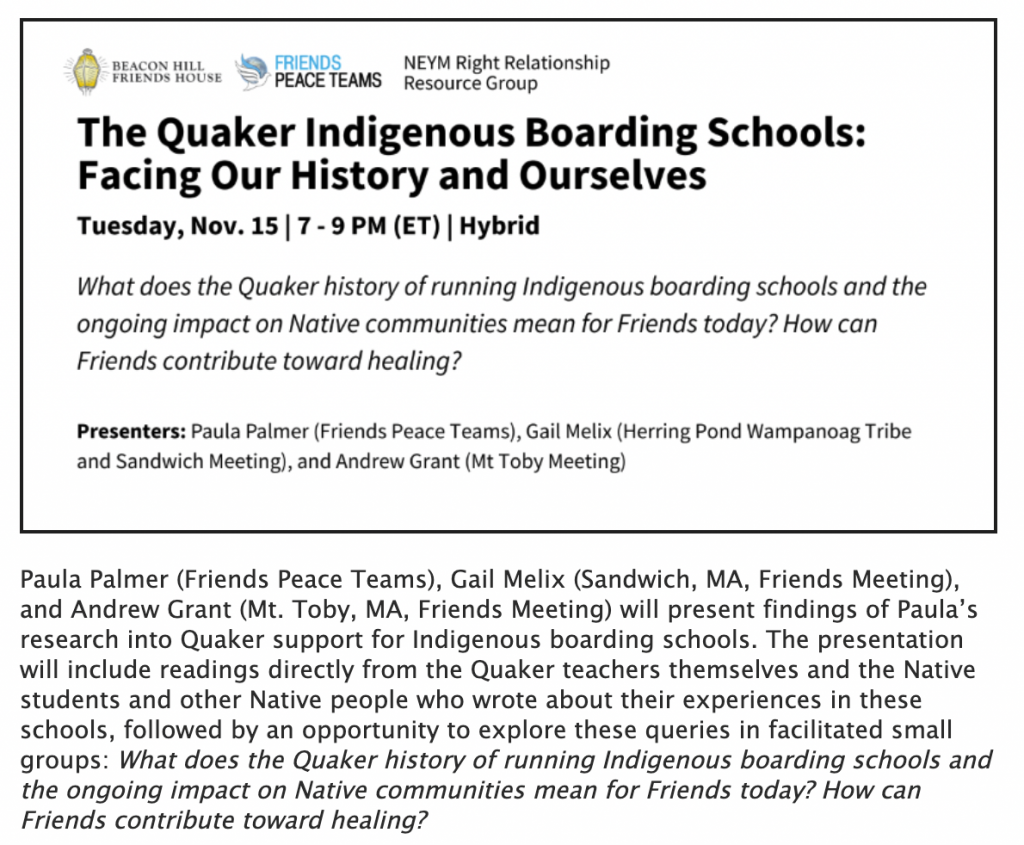
What’s Ahead for the Friends Committee on Maine Public Policy, July 2022
A small group of FCMPP members (Jim Matlack, Shirley Hager, Diane Oltarzewski, Janet Hough, Ann Dodd-Collins and Wayne Cobb) gathered together on July 8th for lunch and a discussion of future FCMPP activities as well as its processes and structure. It was a cordial, extended, and roaming exchange of views and expectations
We agreed that FCMPP should continue to honor its dual emphases from its founding–both civil liberties/legal rights and Wabanaki (Tribal-state relations) issues. Due to the loss of
certain individuals who were closely informed about criminal/restorative justice issues, as well as the rising concern for Tribal justice in recent years, FCMPP has focused almost exclusively on Wabanaki-related issues in recent years. Important personal relationships have been established with Tribal leaders, and Quakers are recognized as reliable allies in campaigns to extend a fuller measure of sovereignty to the Tribes. Yet future politics in Maine are unpredictable and we may find that our work requires renewed focus on the civil liberties agenda.
As a result of the heightened attention to Wabanaki issues, Shirley has taken primary leadership for FCMPP due to her prior experience with these concerns. She has performed admirably but now feels it is important to share leadership for this work, both for the future of FCMPP and to lessen the burdens of her current role. Diane has also said that she wants to step back for a while after a period of intense political activism with FCMPP.
There is a need for new, more active participants in FCMPP and for fresh potential leaders. No certainties emerged from the long conversation, however the group wondered what issues now reach “faith level” engagement among younger Friends. We proposed to approach a young veteran activist among us to help us discern the way forward, both in terms of issues and how we address them, and also how we attract young Friends to our work.
It was agreed that FCMPP should continue to work closely with the Episcopal Committee on Indian Relations. A group of socially active Unitarians (MUUSAN) may also prove to be
valuable allies. These three groups might well join in future meetings with Tribal leaders to avoid duplication of effort and to ease their schedules.
The New England Yearly Meeting Apology project was discussed. So far, Shirley has contacted Tribal leaders of all but one of the Tribes in Maine to make sure that they are
aware of the intent of this project and have a chance to express their willingness to receive the Apology. Shirley has shared their feedback with the NEYM Right Relationship Resource Group that is shepherding the Apology and who will be sending official letters to Tribal leaders.
Looking ahead we expect that a successor bill (or several bills) to L.D. 1626 will emerge in the
Maine legislature. FCMPP will again seek to advance such bill(s)toward passage. New bill numbers will not be released until January. A new Minute/Letter from FCMPP will be
needed to express continued Quaker support for relevant sovereignty legislation. This should
be drafted and cleared so that both Falmouth and Vassalboro Quarterly Meetings can approve the message in timely fashion. Jim Matlack and Wayne Cobb volunteered to look at the previous minutes approved by both Quarters, and to suggest updated language that would be relevant to any new legislation being proposed.
Further efforts should also be made to seek support from Senators King and Collins for a Senate counterpart to H.R. 6707, especially since it is now apparent that Governor Mills has sought to delay consideration of this bill. HR 6707 is the bill introduced by Jared Golden to the House: Advancing Equality for Wabanaki Nations Act.
We anticipate a meeting of the whole in late September or early October.
Jim Matlack, Clerk, FCMPP
Land Acknowledgement Program via Pendle Hill, August 9 and 11
Peace and Social Concerns Committee calls attention to this coming program at Pendle Hill:
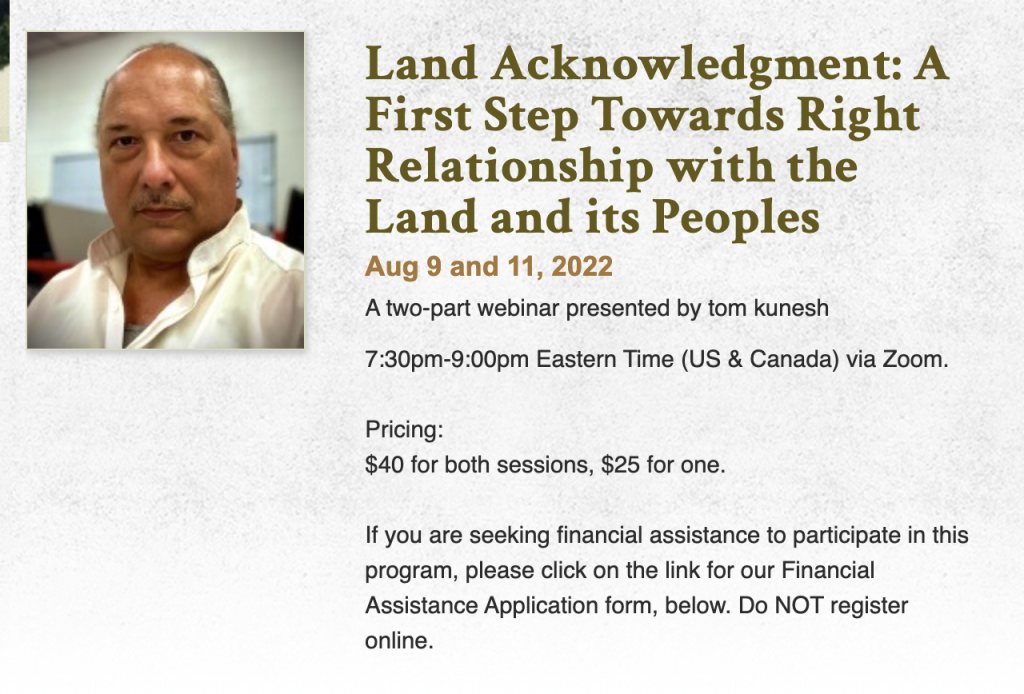
To register, click here
Living on what was another peoples’ homeland through their coerced removal carries with it a generational responsibility to recognize and honor their history and their legitimate claim to places where we live. Recognizing that preparing a land acknowledgment is a first step towards creating right relationship with the land and its native peoples, we will review:
- the Euro-colonial principles and means used to take Turtle Island from its original inhabitants;
- sources for identifying accurate local native history;
- ways to correctly identify and contact culturally affiliated tribes; and
- current land-return movements in the United States.
We undertake this review centering the ultimate goals of writing land acknowledgments, including relationship building, identifying and restoring erased history of local sites, and returning land to native peoples.

To enhance your experience of the webinars, consider consulting the following resources:
1961 – Frantz Fanon, The Wretched of the Earth
1986 – Ngugi wa Thiong’o, Decolonising the Mind: The Politics of Language in African Literature. Some excerpts can be found here: africaspeaks.com/reasoning/index.php?topic=5770.0;wap2
2009 – Chimamanda Ngozi Adichie, The danger of a single story: youtube.com/watch?v=D9Ihs241zeg (19 minutes)
2012 - Tuck & Yang, “Decolonization is not a metaphor”: clas.osu.edu/sites/clas.osu.edu/files/Tuck%20and%20Yang%202012%20Decolonization%20is%20not%20a%20metaphor.pdf
2018 - Liz Nicholson, “Quakers are Colonizers”: quakervoluntaryservice.org/quakers-are-colonizers/
2019 Decolonizing Quakers – Seeking Right Relationship with Indigenous Peoples: decolonizingquakers.org
The resource list from Summer 2020: https://pendlehill.org/fall-conference-2020/working-towards-right-relationship-resources/
Leader(s)
tom kunesh and twelve siblings were born to a Standing Rock lakota tribal member mom and a white lawyer dad, and grew up good-and-catholic in Minnesota on what had been dakota & anishinaabe contested land. He joined the Navy for adventure and the GI Bill, became a linguist, served in the Persian Gulf, Indian Ocean, and Spain, and studied religion. He works today at being a dad, protecting and educating about indigenous sites in Tennessee, attends Nashville Friends Meeting, and hangs out at the intersection of religion, decolonization, atheism, and quiet.
For more information, click here.
LACO Food Pantry Benefit Car Show, June 4, 2022
The annual LACO (Lisbon Area Christian Outreach) car show will be held Saturday, June 4th from 8:00 a.m. to 2:00 p.m. at Shiloh Church in Durham (12 Beulah Lane). Shiloh Church is one of the LACO partner churches (as is Durham Friends Meeting).
Proceeds of the car show benefit the LACO Food Pantry. Breakfast and lunch available. Margaret Copeland writes, “I hope people will come at lunch time since that is when we make most of our money.”
Please direct questions to Margaret Copeland.
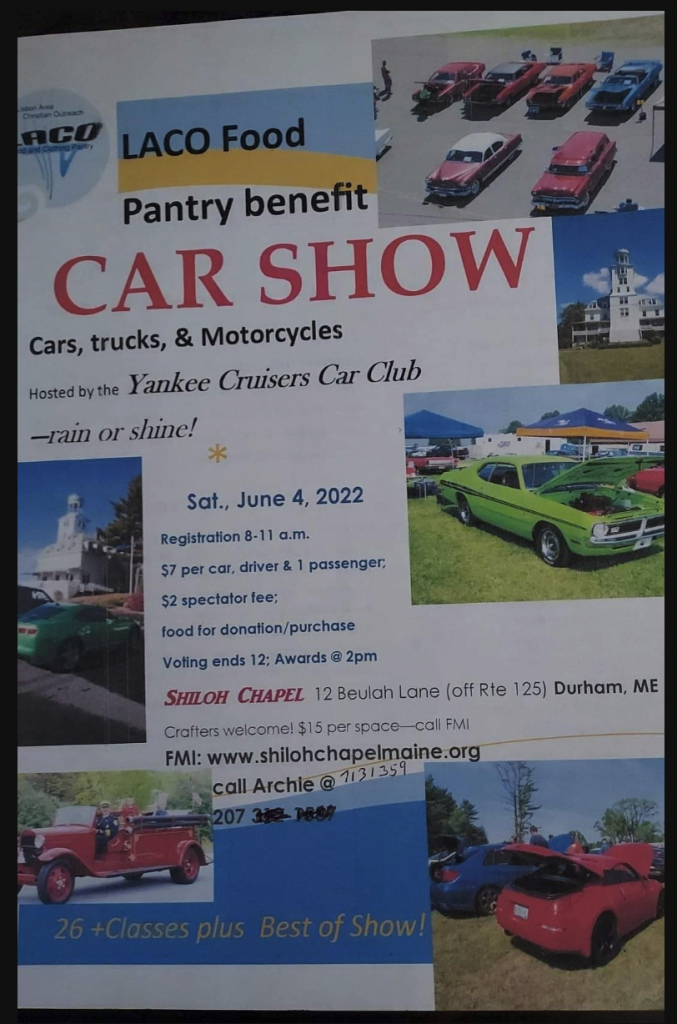
Renaming a Park: Letter to Brunswick Town Council
Durham Friends Letter to the Brunswick Town Council (same text below)
Durham Friends Meeting (Quaker)
532 Quaker Meeting House Road, Durham, MAINE 04222
May 27, 2022
To the Town Councilors of Brunswick,
We write to urge the Town of Brunswick to change the name of its 250th Anniversary Park to Pejepscot Park, and to use the occasion of the renaming to begin telling a truer, more inclusive history of human habitation along the lower Androscoggin River.
Those signing this letter are residents of Brunswick (11 of us) and residents of adjoining towns (another 22). We are all members of Durham Friends Meeting, the Quaker Meeting just over the border from Brunswick in Durham.
We believe that it is important to remember that Indigenous people have lived in this region for thousands of years. They have fished, hunted, and grew food throughout the Androscoggin watershed. At the site of today’s park, they came seasonally to catch salmon and alewives and others as these fish moved upriver to spawn. Likely they had an encampment where the park is now sited. European settlers wanted to make the same use of the fishery, and so they constructed a fort overlooking the lower falls of the Androscoggin, and they built a road from the fort to Maquoit Bay – along a pathway that the Abenaki people portaged their canoes – the same road that is today’s Maine Street and Maquoit Road.
Because of the importance of this site for both the Abenaki and the European settlers, it is simply not right to call this park by a name suggesting that its history began in 1739. There are important stories about this human settlement well before that date, and the precise location of this park is especially important in these stories for both the Abenaki and the European settlers.
There is a plaque in the park today that reads “Historic Site: When the Abenaki were the sole inhabitants of this land, the water here was called Ammoscoggin. The word means ‘Fish coming in Spring.’” This is one form of recognition, but we urge additional recognition by renaming the park. Pejepscot is what the Abenaki called the Androscoggin River below the last falls, the stretch of river for which the park provides a splendid view. Early maps by Europeans also call this stretch of the river the Pejepscot.
For these reasons, and in recognition of the complexity of our mutual history with the Abenaki, we respectfully urge you to consider the name Pejepscot Park, a name that honors and raises up the first inhabitants of this area.
Approved by Durham Friends Meeting,
At its Business Meeting, April 24, 2022
Contact person: Ingrid Chalufour,
clerk of Durham Friends Meeting’s Peace & Social Concerns Committee
ichalufour@gmail.com, 207-483-2620
Some of the individual members of Durham Friends Meeting are the following, who asked that their signatures be included:
Residents of Brunswick:
Kim Bolshaw
Ingrid Chalufour
Charlotte Anne Curtis
Craig Freshley
Theresa Hartford
Mey Hasbrook
Linda Muller
Ann Ruthsdottir
Kathy Jo Williams
Cindy Wood
Paul Wood
Residents of Topsham:
Douglas Bennett
Ellen Bennett
Residents of Auburn
Reneé Coté
Wendy Schlotterbeck
Residents of Bath
Margaret Leitch Copeland
Leslie Manning
Residents of Bowdoinham
M. Jo-an Jacobus
Residents of Durham
Laurie Caton-Lemos
Ezra Smith
Residents of Freeport
Helen Clarkson
Sarah Sprogell
Residents of Harpswell
Wendy Batson
Robert Eaton
Nancy Marstaller
Residents of Norway
Patti-Ann Douglas
James R. Douglas
Residents of Portland
Lyn Clarke
Residents of Richmond
Liana Thompson-Knight
Residents of South Portland
Barbara Simon
Residents of Sumner
Dorothy Hinshaw
Edward Hinshaw
Residents of Yarmouth
Cushing Anthony
Currently residing Out-of-State
Joyce Gibson (Massachusetts)
Brown Lethem (California)

